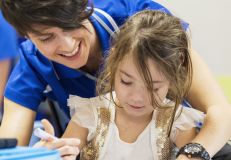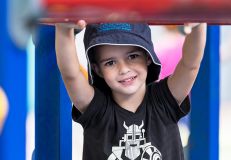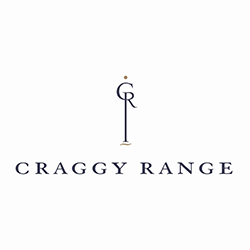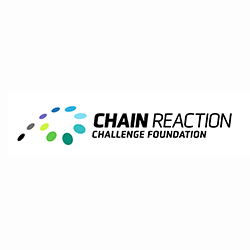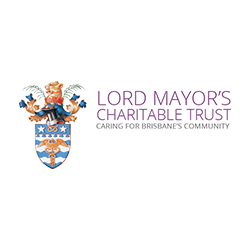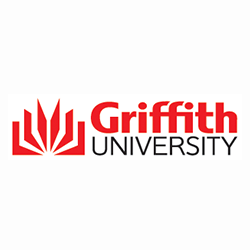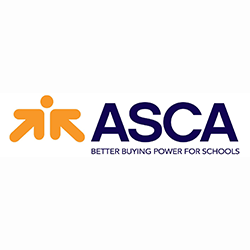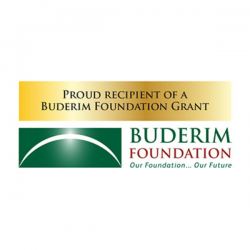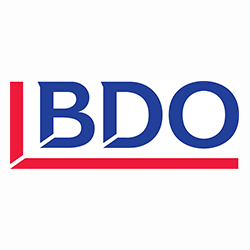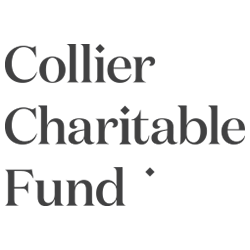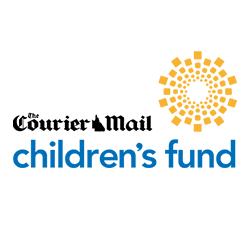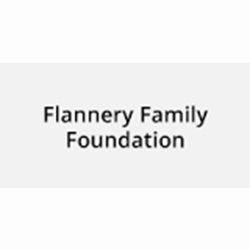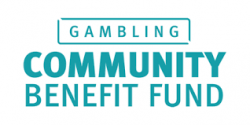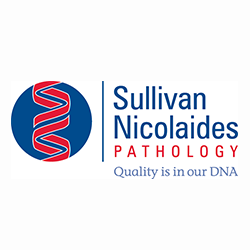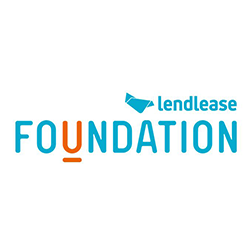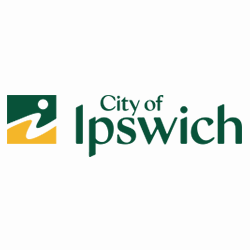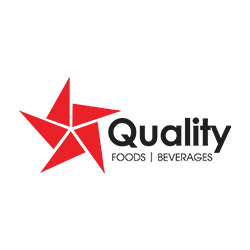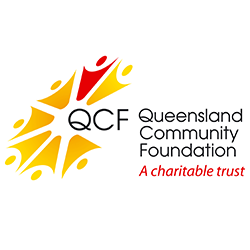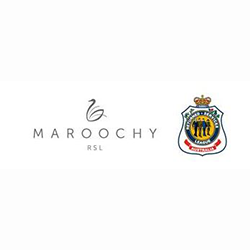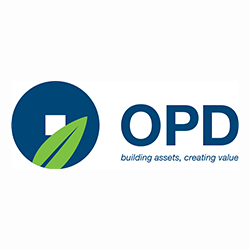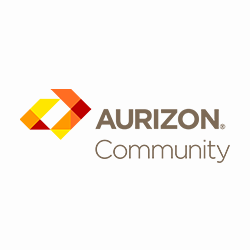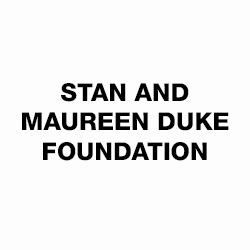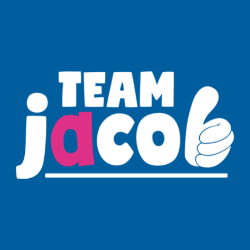The Hogarth Family
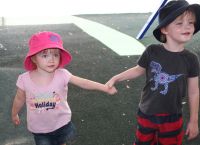
David and I are a regular couple, who happen to have two children who have autism: William who is nearly five and Emily who is almost three.
The week before my 30th birthday I gave birth to our oldest son, Oscar, who was stillborn. It was incredibly hard and after some time, we decided to try again. You can imagine that when William arrived, he was absolutely adored. My hospital room was overflowing with flowers, gifts, messages, visitors and love from family and friends who had given us so much support.
Despite this, though, from day one, William was a difficult baby. I didn’t have another child to compare him to, but he had trouble feeding, sleeping and he screamed all of the time. I can remember thinking ‘how can people in high school get pregnant and look after a baby, and I can’t?’
He was difficult, but he was just who he was, and it wasn’t until I was eight months pregnant with Emily, that William’s childcare teacher pulled us aside and told us he wasn’t hitting his milestones. At that stage, we knew he wasn’t developing speech and language but we didn’t think it was more than a simple delay and we had been working on speech therapy. But he wasn’t engaging with other children at childcare, and when I arrived early to pick him up I would see him just wandering around the perimeter of the playground. He was in his own world.
Around the time Emily was born, we began to take William to doctors to seek advice and therapy, which ultimately led to William’s autism diagnosis. It was a long and difficult process, more so because Emily was a newborn and we were surviving on little sleep and the fear of the unknown.
We had heard of AEIOU Foundation and enrolled William for full-time early intervention. We went on the waiting list for the Nathan Centre and the Park Ridge centre, and we were delighted when we received a placement. Once we got to AEIOU, I was able to take a step back.
That’s when I began to pay more attention to Emily. She’s completely different. William is under-sensitive to touch so he climbs on me all of the time, and likes firm pressure to calm himself. On the other hand, Emily is oversensitive to touch and has always preferred physical comfort on her terms only. She internalised everything, where William externalises everything.
She was a great baby though, and went along with everything. She was a good eater and she slept well. In fact, when she was born, we actually had a moment where we said to each other “oh, a girl…she won’t have autism.”
But, by the time she was 12 months old I noticed that she wasn’t waving, nodding her head, pointing, or using any other non-verbal gestures. When she was 18 months old, we knew there was a problem because she hadn’t started talking. Because of AEIOU, I knew more about autism and how to manage. We helped Will with therapy at home, and I began to use PECS (Picture Exchange Card System) with Emily, and she began to communicate with us that way. This significantly alleviated her anxiety.
We were able to receive an earlier autism diagnosis for Emily, and as a result, she started at AEIOU at an earlier age than Will did and she’s developing new skills faster.
It’s difficult when you receive a diagnosis. While it’s not a physical loss of a child, like when we lost Oscar, you still lose your hopes and dreams for the future. Often you don’t even realise it, but everyone has expectations for their children like they’ll talk, make friends, drive a car and have a regular school experience. For that reason, and many others, Autism affects parents profoundly too. For me, I felt like ever since Oscar, we were ‘surviving’. I would think I was at my breaking point, but then we received William’s ASD diagnosis, and I thought that was my breaking point… and then we received Emily’s diagnosis.
I was also always a very sociable person, but having children with ASD can be very isolating. The thing is that children with autism don’t look any different to anyone else. And as they get older, it becomes harder to manage their meltdowns. When they’re small, you can pick them up and remove them from a situation. I can’t do that anymore. And as they get older, it’s become less publically acceptable … people assume they are having a tantrum or that they are spoiled and misbehaving when in fact, they are experiencing a sensory overload. It might be a loud noise, a flashing light, a strong perfume, or something else as simple as wind blowing through the trees which has affected their sensory system.
As a result, a family outing is never spontaneous. It can take up to a month to prepare the children for a change in routine and we have a big calendar at home and talk constantly about what’s happening when, with who and for how long.
It’s very important to ask for help and be open to receiving it. We have a great support network, and with the help of the team at AEIOU, we’re slowly figuring it out, day by day. We may not know what the future holds, but we know that we will support them to be the best they can be, and that AEIOU has helped them to establish important foundations for their future.
With AEIOU’s help, Will has been toilet trained, and has transitioned to school. He can communicate verbally, and he can play with other children. It is amazing for me to see that he is making his own friends at school. Emily has found her voice and loves to sing, and has charmed everybody in her class at AEIOU.
I have a wonderful husband who works incredibly hard for us so we can provide the support our children need, and great family and friends who, unbelievably, are still there for us despite the ongoing drama.
We are finally “Mum” and “Dad”. Hearing that for the first time was the ultimate ‘WOW’ moment … I was a mother for four years before I got to hear that. We don’t take that for granted, there are many parents out there who will never hear those words. There are also people who live in regional areas or simply can’t afford the cost of intensive early intervention who have it much harder than we do.
Our situation might be difficult, but I want people to know that there are great days and moments too. We’re so proud of Will and Em and everything they achieve. I am particularly proud of their sibling relationship. Given they both have autism, it was never a given that they would even acknowledge each other’s presence – so for us that’s massive.
My hope for Will and Emily is for them to be happy, confident and productive members of society in their own way. We have no preconceived ideas: we’re just focussed on getting to know them for who they are.
- Therese Hogarth
Back to Stories- About
- Our Story
- Our Vision, Purpose & Values
- Our commitment to reconciliation
- Our Families
- Share your story
- Our Partners
- Our Ambassadors
- Our Board of Directors
- Our Executive Leadership Team
- Research
- Work with us
In Focus
AEIOU responds to Thriving Kids — national early supports for children with...
20th Feb. 2026Under the current timeline, Thriving Kids will begin state and territory...
From The BlogAnnual Report 2024-2025
23rd Jan. 2026As AEIOU Foundation marks two decades of service, we remain Australia’s...

